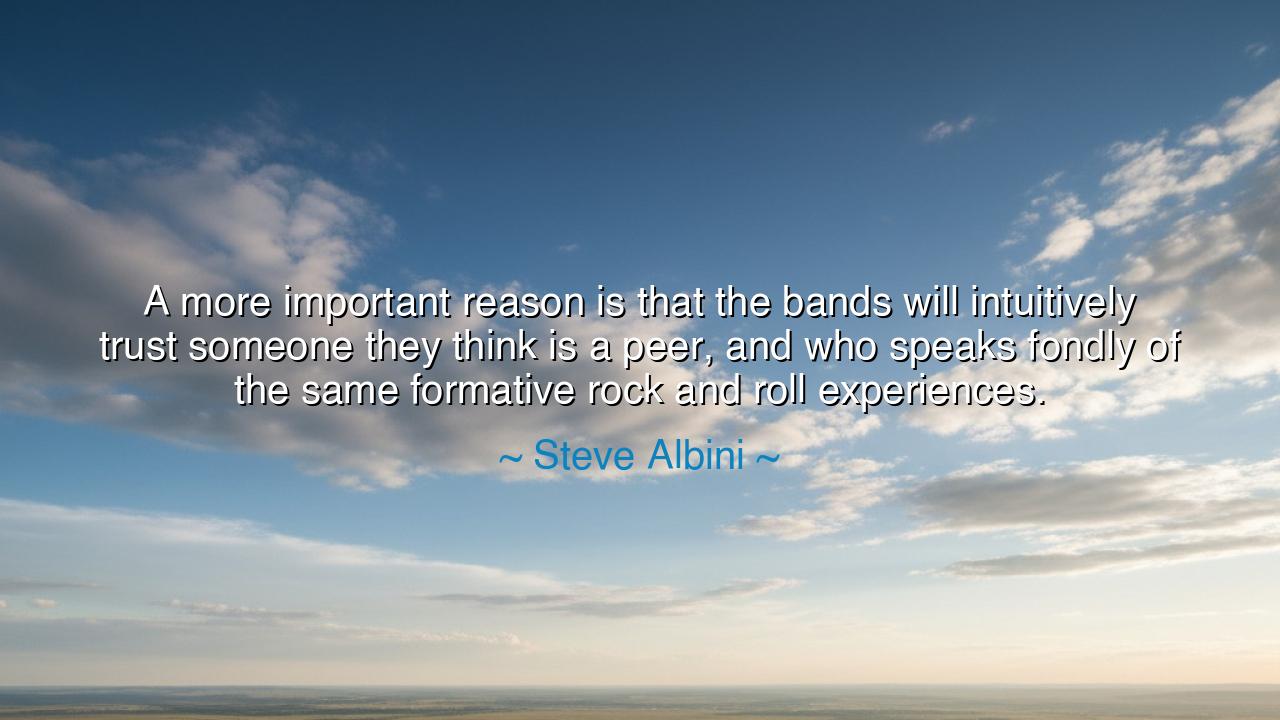
A more important reason is that the bands will intuitively trust
A more important reason is that the bands will intuitively trust someone they think is a peer, and who speaks fondly of the same formative rock and roll experiences.






In the words of Steve Albini, “A more important reason is that the bands will intuitively trust someone they think is a peer, and who speaks fondly of the same formative rock and roll experiences.” Here, the master of sound reveals a truth not confined to music alone, but to all of human fellowship: that trust is not born of authority, but of kinship. Men and women open their hearts not to those who stand above them, distant and cold, but to those who stand beside them, sharing the same memories, the same battles, the same songs of their youth.
Albini speaks from the world of music, where artists seek guides who will not exploit them, but serve their art. To speak fondly of formative experiences is to show that one has drunk from the same river, that one’s soul has been shaped by the same rhythms, the same passions. A band, young and unsteady, does not need a tyrant in the studio; they need a comrade. They give their trust to the one who shows, not through speeches, but through shared history, that he is one of them.
This truth is eternal. Consider the great general Alexander the Great, who was loved by his soldiers not because he commanded from afar, but because he marched with them, ate their food, shared their hardships. He was a king, yet also a peer. His men trusted him because he had lived their life, fought their battles, remembered their songs. Authority without kinship breeds fear; authority with kinship breeds trust. Albini, in his own way, applies the same principle to the sacred act of making music.
We see this also in the life of Abraham Lincoln, who, though president, spoke with the cadence of the common man. He was trusted because he remembered the soil, the axe, the struggles of the ordinary. His words carried the weight of shared experience, not the aloofness of power. In the same way, a band in the studio looks for the producer who remembers the sweaty clubs, the first broken guitar strings, the hunger of youth. It is not titles or credentials that matter most, but the shared music of memory.
Albini’s insight carries a warning too: beware the leader who has forgotten what it means to be a peer. Those who speak only from authority, but not from experience, may command obedience but will never inspire trust. For trust is intuitive—it cannot be demanded, only earned. It springs from recognition: “This one knows me. This one has walked where I have walked.” That recognition is more powerful than any contract, more binding than any law.
The meaning of Albini’s words is that true leadership, whether in music, in politics, or in life, requires humility. The wise guide does not stand apart, but among. He does not preach from a distance, but recalls the common fire that shaped them all. In doing so, he becomes more than a leader; he becomes a brother, a fellow traveler, a companion on the journey.
The lesson for us is clear: if you would win the trust of others, do not build walls of pride, but bridges of memory. Speak not only of your strength, but of your struggles. Recall the beginnings, the small victories, the shared passions that connect you with those you lead. Whether in the workplace, the family, or the nation, trust grows when we see each other as peers in the human story, all bound by the same longings and the same songs.
So let Albini’s words be passed on as wisdom for every age: those who wish to be trusted must show they are kin. Speak with warmth of the experiences that shaped you, honor the roots you share with others, and walk not above them, but beside them. For it is not authority that binds men together, but fellowship—and from fellowship, trust arises like music, eternal and unbreakable.






GAHoang Gia An
I find this quote fascinating because it touches on the idea that people trust those who seem like ‘one of them.’ It’s a comforting notion, especially in creative fields like music, where authenticity can feel like everything. But, does this trust always lead to positive outcomes? Could it sometimes cloud judgment if the shared experiences are more about nostalgia than true expertise?
VApham thi van anh
This quote captures the essence of why authenticity and common experience matter so much in the music industry. But I wonder – is this exclusive connection sometimes limiting? If bands only trust people who speak about the same ‘formative rock and roll experiences,’ does that inadvertently create echo chambers or limit the diversity of ideas and perspectives in the industry?
YNHoang N. Yen Nhi
Albini’s insight really makes me think about the power of relatability in building trust. When you share common ground with someone, especially something as visceral as music, it seems to naturally create an understanding between you. But does that also mean that those who don’t share the same experiences can never form that same bond? How much does personal history really impact trust in professional settings?
TNHoang Nguyen Thao Nguyen
This quote speaks to the deep connection that shared experiences can create, especially in the world of music. It makes me wonder if this trust extends beyond just rock and roll – does shared culture or similar struggles make people more likely to connect in any field? I guess there’s a certain camaraderie that forms when people feel like they’ve walked the same path.